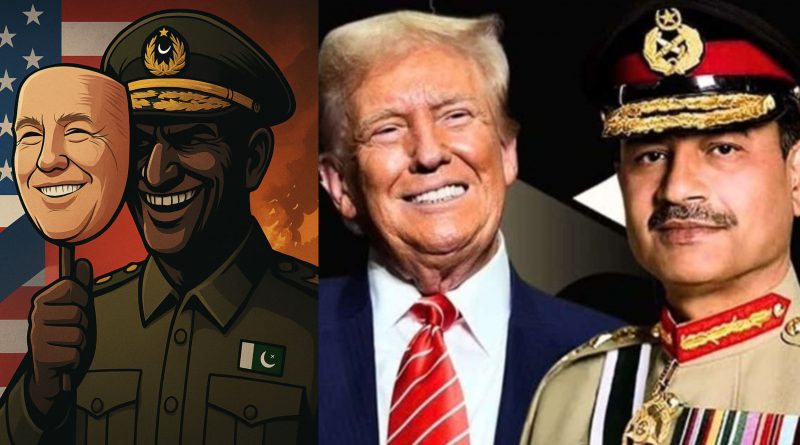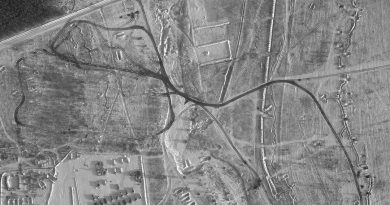Running with the West, Hunting with the Ummah: Pakistan’s Double-Standards
Pakistan has repeatedly weaponized the idea of “Ummah solidarity”—not as a moral or theological commitment, but as a bargaining chip in global diplomacy.
Pakistan’s Army Chief, Field Marshal Asim Munir, has recently triggered global alarm by threatening that if pushed to the brink, Pakistan would “take half the world down,” explicitly naming India. Speaking in the U.S., he also hinted at missile strikes on Indian dams and economic assets, including Mukesh Ambani’s Jamnagar refinery.
India’s Ministry of External Affairs condemned the remarks as “nuclear sabre-rattling” and labelled Pakistan an “irresponsible nuclear state,” vowing not to yield to nuclear blackmail. Officials called it “regrettable” that such threats were made from the soil of a friendly third country.
Such bravado, however, is at odds with Pakistan’s historical pattern of opportunism and duplicity on the global stage — a track record that belies its self-portrayal as a principled actor.
From its crypto-alliance with the United States during the war in Afghanistan, to betraying Iran by passing intelligence to Washington; from waging a silent war against its own Pashtun population through forced displacement and resource exploitation, to the mass expulsion of Afghan refugees; from its deafening silence on China’s repression of Uyghur Muslims, to suppressing Palestinian factions during Black September in Jordan; from covertly aligning with Israel in the Azerbaijan–Armenia conflict, to backing both Iran and Donald Trump — whom it bizarrely nominated for the Nobel Peace Prize — Pakistan’s foreign policy has often been a study in contradictions.
These contradictions reveal a nation untethered to any consistent moral compass or principled foreign policy. Pakistan epitomizes the adage: running with the hare and hunting with the hounds.
Pakistan’s Betrayal of Iran
Iranian commentators have long accused Islamabad of pursuing self-interest at Tehran’s expense. Following Pakistan’s June 2025 luncheon with U.S. President Donald Trump at Mar-a-Lago, the government even announced its intention to recommend Trump for the 2026 Nobel Peace Prize — a surreal move given Trump’s record of hostility toward Iran.
Only two days later, the U.S. launched devastating bunker-buster strikes on Iran’s nuclear facilities at Natanz, Isfahan, and Fordow. In a strange diplomatic twist, Pakistan publicly condemned the strikes and expressed “solidarity with the Islamic Republic of Iran,” even while maintaining private overtures to Trump.
Jamiat Ulema-e-Islam (Fazl), one of Pakistan’s largest religious parties, denounced the Nobel move as “morally indefensible.” Party chief Maulana Fazlur Rehman blasted it as an insult to victims of American aggression across the Muslim world.
The double-speak reflects a familiar pattern: Islamabad leveraging the “Ummah card” to appease domestic audiences, while pursuing pragmatic deals with Washington. Meanwhile, Iran continues to accuse Pakistan of harboring extremist groups like Jaish al-Adl, which launch deadly attacks on Iranian border guards from sanctuaries in Pakistan’s Balochistan province.
Pakistan’s Betrayal of the United States
Pakistan’s duplicity vis-à-vis Washington is not new—it is historical.
During the U.S.-led “War on Terror” after 2001, Pakistan allowed American forces to use its airbases while simultaneously sheltering and supporting jihadist proxies that targeted U.S. troops in Afghanistan. Billions of dollars in American aid poured into Islamabad, yet the ISI covertly facilitated the Taliban and the Haqqani Network.
The most damning episode came in 2011 when Osama Bin Laden was discovered living in Abbottabad, just a short distance from Pakistan’s premier military academy. The U.S. Navy SEAL raid that killed him exposed Islamabad’s double game.
Yet, in 2020, then Prime Minister Imran Khan openly called Bin Laden a “martyr” in Pakistan’s parliament. Former U.S. Secretaries of State Hillary Clinton and Mike Pompeo both condemned Islamabad’s duplicity.
Clinton memorably said: “You can’t keep snakes in your backyard and expect them only to bite your neighbors.” Pompeo, in his 2023 memoir Never Give an Inch, recounted in detail how Pakistan undermined U.S. operations while pocketing aid.
By 2025, Pakistan had again drawn international ire by forcibly expelling more than a million Afghan refugees, many registered with the UNHCR. UN reports documented widespread abuses against returnees, particularly women and minorities, exposing the emptiness of Pakistan’s claims of “Ummah solidarity.”
Visit to the U.S.: War on Terror or War on Pashtuns?
Munir’s recent U.S. visit must also be understood in light of Pakistan’s decades-long militarization of its Pashtun belt. Under the guise of the “War on Terror,” Islamabad has waged a parallel war against its own Pashtun population, treating the tribal belt as both a buffer zone and an economic colony.
For years, Pakistan has deliberately kept low-intensity conflict simmering in the region to justify military control. Human Rights Watch and Amnesty International have repeatedly documented mass arrests, extrajudicial killings, and the denial of due process, pointing to a systemic policy of securitization.
By engineering insecurity, the state ensures that local communities accept a perpetual military presence and even foreign interference in the name of peace. The Pashtun Tahafuz Movement (PTM) has gone further, recording numerous cases in which civilian areas were bombed under the pretext of counterterrorism.
The cost for ordinary Pashtuns has been devastating. Entire villages have been burned, residents uprooted, and people pushed into economic marginalization — a process critics describe as deliberate demographic engineering.
According to the Internal Displacement Monitoring Centre (IDMC), more than five million Pashtuns were displaced during military operations between 2004 and 2016, many of whom remain in limbo without adequate resettlement or compensation.
At the same time, the mineral-rich belt of Khyber Pakhtunkhwa and Balochistan has become a source of extraction rather than empowerment. Gold, copper, and lithium deposits — vital for the global energy transition — are siphoned off by military-linked conglomerates and foreign partners, while local communities continue to live in poverty.
Reports from the Pakistan Institute of Development Economics (PIDE) note how extractive projects disproportionately benefit military and political elites, leaving indigenous populations excluded from any meaningful share of the wealth.
Munir’s anti-India rhetoric in Washington thus masks a deeper agenda: securing U.S. geopolitical indulgence while sustaining the internal war economy on Pashtun soil.
Selective Outrage: Uyghurs Ignored, Palestinians Betrayed
Pakistan’s “principled” defense of Muslim causes unravels most starkly when examined through its selective outrage. Nowhere is this clearer than in its silence on China’s persecution of Uyghur Muslims and its contradictory stance on Palestine. Despite Beijing’s demolition of mosques, erasure of Islamic culture, and incarceration of more than a million Uyghurs in Xinjiang camps, Pakistan’s leadership has never once raised the issue on international platforms.
When pressed in 2020 on why he vocally condemned India’s actions in Kashmir but remained mute on China’s atrocities in Xinjiang, then Prime Minister Imran Khan candidly admitted: “China has been a great friend… we do talk about things with China privately, not publicly.” The remark underscored that Islamabad’s so-called “Ummah solidarity” is less moral conviction than transactional diplomacy.
The same duplicity marks its approach to Palestine. For decades, Pakistan has claimed to be the staunchest defender of the Palestinian cause, even stamping its passports with the phrase: valid for all countries except Israel.
Yet its actions tell a different story. During Black September in 1970, Pakistani General Zia-ul-Haq, then stationed in Jordan, advised Jordanian forces during their bloody crackdown on Palestinian factions. Between 3,000 and 5,000 Palestinians were killed, with more than 25,000 displaced — a massacre rarely acknowledged in Pakistani discourse.
Fast forward to 2020, and Pakistan stood with Turkey in backing Azerbaijan during its war against Armenia, even as Israel supplied Baku with drones and precision munitions. The result was an effective alignment of Pakistan, Turkey, and Israel — a triangular cooperation that starkly contradicted Islamabad’s anti-Israel rhetoric.
What It All Means
Pakistan has repeatedly weaponized the idea of “Ummah solidarity”—not as a moral or theological commitment, but as a bargaining chip in global diplomacy.
Its foreign policy choices reveal a pattern: alliance with the U.S. while sponsoring its enemies; posturing as Iran’s partner while sheltering anti-Iran militants; waving the Palestinian flag while aiding Israel’s allies; condemning India while staying mute on China’s genocide against Muslims.
This is not a strategy. It is duplicity dressed up as ideology.
Pakistan continues to run with the West while hunting with the Ummah—a game that fools no one and secures nothing lasting.



